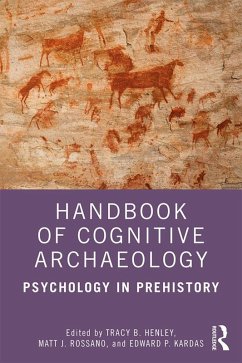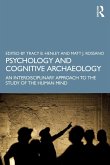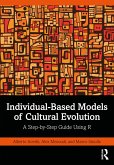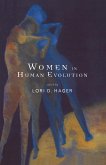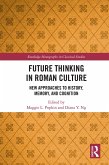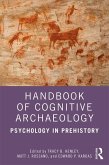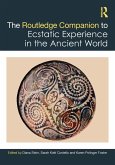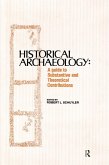Handbook of Cognitive Archaeology (eBook, ePUB)
Psychology in Prehistory
Redaktion: Henley, Tracy B.; Kardas, Edward P.; Rossano, Matt J.
106,95 €
106,95 €
inkl. MwSt.
Sofort per Download lieferbar

53 °P sammeln
106,95 €
Als Download kaufen

106,95 €
inkl. MwSt.
Sofort per Download lieferbar

53 °P sammeln
Jetzt verschenken
Alle Infos zum eBook verschenken
106,95 €
inkl. MwSt.
Sofort per Download lieferbar
Alle Infos zum eBook verschenken

53 °P sammeln
Handbook of Cognitive Archaeology (eBook, ePUB)
Psychology in Prehistory
Redaktion: Henley, Tracy B.; Kardas, Edward P.; Rossano, Matt J.
- Format: ePub
- Merkliste
- Auf die Merkliste
- Bewerten Bewerten
- Teilen
- Produkt teilen
- Produkterinnerung
- Produkterinnerung

Bitte loggen Sie sich zunächst in Ihr Kundenkonto ein oder registrieren Sie sich bei
bücher.de, um das eBook-Abo tolino select nutzen zu können.
Hier können Sie sich einloggen
Hier können Sie sich einloggen
Sie sind bereits eingeloggt. Klicken Sie auf 2. tolino select Abo, um fortzufahren.

Bitte loggen Sie sich zunächst in Ihr Kundenkonto ein oder registrieren Sie sich bei bücher.de, um das eBook-Abo tolino select nutzen zu können.
The Handbook of Cognitive Archaeology organizes the cognitive archaeological landscape into a strong psychological framework, opening the field to scholars across behavioral sciences with contributions from leading experts covering topics in physiological, cognitive, developmental, social, and abnormal psychology.
- Geräte: eReader
- ohne Kopierschutz
- eBook Hilfe
- Größe: 10.03MB
Andere Kunden interessierten sich auch für
![Psychology and Cognitive Archaeology (eBook, ePUB) Psychology and Cognitive Archaeology (eBook, ePUB)]() Psychology and Cognitive Archaeology (eBook, ePUB)38,95 €
Psychology and Cognitive Archaeology (eBook, ePUB)38,95 €![Individual-Based Models of Cultural Evolution (eBook, ePUB) Individual-Based Models of Cultural Evolution (eBook, ePUB)]() Alberto AcerbiIndividual-Based Models of Cultural Evolution (eBook, ePUB)51,95 €
Alberto AcerbiIndividual-Based Models of Cultural Evolution (eBook, ePUB)51,95 €![Women In Human Evolution (eBook, ePUB) Women In Human Evolution (eBook, ePUB)]() Women In Human Evolution (eBook, ePUB)21,95 €
Women In Human Evolution (eBook, ePUB)21,95 €![Future Thinking in Roman Culture (eBook, ePUB) Future Thinking in Roman Culture (eBook, ePUB)]() Future Thinking in Roman Culture (eBook, ePUB)40,95 €
Future Thinking in Roman Culture (eBook, ePUB)40,95 €![Handbook of Cognitive Archaeology (eBook, PDF) Handbook of Cognitive Archaeology (eBook, PDF)]() Handbook of Cognitive Archaeology (eBook, PDF)106,95 €
Handbook of Cognitive Archaeology (eBook, PDF)106,95 €![The Routledge Companion to Ecstatic Experience in the Ancient World (eBook, ePUB) The Routledge Companion to Ecstatic Experience in the Ancient World (eBook, ePUB)]() The Routledge Companion to Ecstatic Experience in the Ancient World (eBook, ePUB)44,95 €
The Routledge Companion to Ecstatic Experience in the Ancient World (eBook, ePUB)44,95 €![Historical Archaeology (eBook, ePUB) Historical Archaeology (eBook, ePUB)]() Robert L SchuylerHistorical Archaeology (eBook, ePUB)89,95 €
Robert L SchuylerHistorical Archaeology (eBook, ePUB)89,95 €-
-
-
The Handbook of Cognitive Archaeology organizes the cognitive archaeological landscape into a strong psychological framework, opening the field to scholars across behavioral sciences with contributions from leading experts covering topics in physiological, cognitive, developmental, social, and abnormal psychology.
Dieser Download kann aus rechtlichen Gründen nur mit Rechnungsadresse in A, B, BG, CY, CZ, D, DK, EW, E, FIN, F, GR, HR, H, IRL, I, LT, L, LR, M, NL, PL, P, R, S, SLO, SK ausgeliefert werden.
Produktdetails
- Produktdetails
- Verlag: Taylor & Francis
- Seitenzahl: 580
- Erscheinungstermin: 24. Juli 2019
- Englisch
- ISBN-13: 9780429950025
- Artikelnr.: 57198015
- Verlag: Taylor & Francis
- Seitenzahl: 580
- Erscheinungstermin: 24. Juli 2019
- Englisch
- ISBN-13: 9780429950025
- Artikelnr.: 57198015
Tracy B. Henley is Professor and Head of Psychology at Texas A & M University-Commerce, USA. He works primarily on historical matters, social cognition, and psycholinguistics. He has several previous books related to the history of psychology. Matt J. Rossano is Professor of Psychology at Southeastern Louisiana University, USA, where he studies the evolution of ritual, religion, and cooperation. His books include: Supernatural Selection: How Religion Evolved and Mortal Rituals. Edward P. Kardas is Distinguished Professor of Psychology and Director of the Honors College at Southern Arkansas University, USA, where he has taught since 1980. He is the author of books on the Internet, research methods, and the history of psychology.
Foreword I Trevor Watkins Foreword II Valerie E. Stone Part One 1.
Introduction: What would Wundt think? Edward P. Kardas & Tracy B. Henley
2. Before, After, and Alongside the Excavation: How to Think About the
Evolution and History of Physiology and Development Melvin Konner 3. Life
History Evolution in Hominins Jon Oxford & David C. Geary 4. Evolution of
Hormonal Mechanisms for Human Family Relationships Heather Habecker & Mark
V. Flinn 5. The Evolution and Development of Morality Dennis L. Krebs 6. In
Search of Baselines: Why Psychology Needs Cognitive Archaeology Darcia
Narvaez 7. Play: A Neglected Factor in Ritual, Religion, and Human
Evolution Gordon M. Burghardt Part Two 8. The Origins of Generativity
Michael C. Corballis 9. Three stages in the Evolution of the Human
Cognition: Normativity, Recursion, and Abstraction Ceri Shipton 10. The
Evolution of Learning and Memory in Humans: Comparative Perspectives on
Testing Adaptive Hypotheses Mark A. Krause & Crickette Sanz 11.
Reconfiguring Natural Semantic Metalanguage for a Deep Cognitive
Archaeology Horacio Fabrega, Jr. 12. Exploring the Psychological Basis for
Transitions in the Archaeological Record Liane Gabora & Cameron M. Smith
13. The Cognitive Mechanisms Deriving from the Acheulean Handaxe that give
rise to Symmetry, Form, and Pattern Perception Derek Hodgson 14. The Role
of Expert Technical Cognition in Human Evolution Thomas Wynn & Frederick L.
Coolidge Part Three 15. Key Cognitive Preconditions for the Evolution of
Language Merlin Donald 16. The Human Social Mind and the Inextricability of
Science and Religion Mark Nielsen 17. Markers of 'Psycho-Cultural' Change:
The early Neolithic Monuments of Göbekli Tepe in southeastern Turkey
Oliver Dietrich, Jens Notroff, Sebastian Walter, & Laura Dietrich 18. How
Ritual Made us Human Matt J. Rossano 19. The Role of Egalitarianism and
Gender Ritual in the Evolution of Symbolic Cognition Camilla Power 20.
Norms and Their Evolution Kim Sterelny 21. Power, Play, and Interplay: The
Psychology of Prehistoric Sexuality Timothy Taylor Part Four 22. Domestic
Fire, Domestic Selves: How Keeping Fire Facilitated the Evolution of
Emotions and Emotion Regulation Terrence Twomey 23. Psychology in
Archaeology: The Secret Society Case Brian Hayden 24. The Archaeology of
Madness David S. Whitley 25. The Prehistory of Psychoactive Substance Use
Edward H. Hagen & Shannon Tushingham 26. The Lure of Death: Suicide and
Human Evolution Nicholas Humphrey 27. From Corpse to Symbol: Proposed
Cognitive Grades over the Long-term Evolution of Hominin Mortuary Activity
Paul Pettitt 28. Afterword: Psychology and Archaeology - The Past's Long
Reach Matt J. Rossano, Tracy B. Henley, & Edward P. Kardas
Introduction: What would Wundt think? Edward P. Kardas & Tracy B. Henley
2. Before, After, and Alongside the Excavation: How to Think About the
Evolution and History of Physiology and Development Melvin Konner 3. Life
History Evolution in Hominins Jon Oxford & David C. Geary 4. Evolution of
Hormonal Mechanisms for Human Family Relationships Heather Habecker & Mark
V. Flinn 5. The Evolution and Development of Morality Dennis L. Krebs 6. In
Search of Baselines: Why Psychology Needs Cognitive Archaeology Darcia
Narvaez 7. Play: A Neglected Factor in Ritual, Religion, and Human
Evolution Gordon M. Burghardt Part Two 8. The Origins of Generativity
Michael C. Corballis 9. Three stages in the Evolution of the Human
Cognition: Normativity, Recursion, and Abstraction Ceri Shipton 10. The
Evolution of Learning and Memory in Humans: Comparative Perspectives on
Testing Adaptive Hypotheses Mark A. Krause & Crickette Sanz 11.
Reconfiguring Natural Semantic Metalanguage for a Deep Cognitive
Archaeology Horacio Fabrega, Jr. 12. Exploring the Psychological Basis for
Transitions in the Archaeological Record Liane Gabora & Cameron M. Smith
13. The Cognitive Mechanisms Deriving from the Acheulean Handaxe that give
rise to Symmetry, Form, and Pattern Perception Derek Hodgson 14. The Role
of Expert Technical Cognition in Human Evolution Thomas Wynn & Frederick L.
Coolidge Part Three 15. Key Cognitive Preconditions for the Evolution of
Language Merlin Donald 16. The Human Social Mind and the Inextricability of
Science and Religion Mark Nielsen 17. Markers of 'Psycho-Cultural' Change:
The early Neolithic Monuments of Göbekli Tepe in southeastern Turkey
Oliver Dietrich, Jens Notroff, Sebastian Walter, & Laura Dietrich 18. How
Ritual Made us Human Matt J. Rossano 19. The Role of Egalitarianism and
Gender Ritual in the Evolution of Symbolic Cognition Camilla Power 20.
Norms and Their Evolution Kim Sterelny 21. Power, Play, and Interplay: The
Psychology of Prehistoric Sexuality Timothy Taylor Part Four 22. Domestic
Fire, Domestic Selves: How Keeping Fire Facilitated the Evolution of
Emotions and Emotion Regulation Terrence Twomey 23. Psychology in
Archaeology: The Secret Society Case Brian Hayden 24. The Archaeology of
Madness David S. Whitley 25. The Prehistory of Psychoactive Substance Use
Edward H. Hagen & Shannon Tushingham 26. The Lure of Death: Suicide and
Human Evolution Nicholas Humphrey 27. From Corpse to Symbol: Proposed
Cognitive Grades over the Long-term Evolution of Hominin Mortuary Activity
Paul Pettitt 28. Afterword: Psychology and Archaeology - The Past's Long
Reach Matt J. Rossano, Tracy B. Henley, & Edward P. Kardas
Foreword I Trevor Watkins Foreword II Valerie E. Stone Part One 1.
Introduction: What would Wundt think? Edward P. Kardas & Tracy B. Henley
2. Before, After, and Alongside the Excavation: How to Think About the
Evolution and History of Physiology and Development Melvin Konner 3. Life
History Evolution in Hominins Jon Oxford & David C. Geary 4. Evolution of
Hormonal Mechanisms for Human Family Relationships Heather Habecker & Mark
V. Flinn 5. The Evolution and Development of Morality Dennis L. Krebs 6. In
Search of Baselines: Why Psychology Needs Cognitive Archaeology Darcia
Narvaez 7. Play: A Neglected Factor in Ritual, Religion, and Human
Evolution Gordon M. Burghardt Part Two 8. The Origins of Generativity
Michael C. Corballis 9. Three stages in the Evolution of the Human
Cognition: Normativity, Recursion, and Abstraction Ceri Shipton 10. The
Evolution of Learning and Memory in Humans: Comparative Perspectives on
Testing Adaptive Hypotheses Mark A. Krause & Crickette Sanz 11.
Reconfiguring Natural Semantic Metalanguage for a Deep Cognitive
Archaeology Horacio Fabrega, Jr. 12. Exploring the Psychological Basis for
Transitions in the Archaeological Record Liane Gabora & Cameron M. Smith
13. The Cognitive Mechanisms Deriving from the Acheulean Handaxe that give
rise to Symmetry, Form, and Pattern Perception Derek Hodgson 14. The Role
of Expert Technical Cognition in Human Evolution Thomas Wynn & Frederick L.
Coolidge Part Three 15. Key Cognitive Preconditions for the Evolution of
Language Merlin Donald 16. The Human Social Mind and the Inextricability of
Science and Religion Mark Nielsen 17. Markers of 'Psycho-Cultural' Change:
The early Neolithic Monuments of Göbekli Tepe in southeastern Turkey
Oliver Dietrich, Jens Notroff, Sebastian Walter, & Laura Dietrich 18. How
Ritual Made us Human Matt J. Rossano 19. The Role of Egalitarianism and
Gender Ritual in the Evolution of Symbolic Cognition Camilla Power 20.
Norms and Their Evolution Kim Sterelny 21. Power, Play, and Interplay: The
Psychology of Prehistoric Sexuality Timothy Taylor Part Four 22. Domestic
Fire, Domestic Selves: How Keeping Fire Facilitated the Evolution of
Emotions and Emotion Regulation Terrence Twomey 23. Psychology in
Archaeology: The Secret Society Case Brian Hayden 24. The Archaeology of
Madness David S. Whitley 25. The Prehistory of Psychoactive Substance Use
Edward H. Hagen & Shannon Tushingham 26. The Lure of Death: Suicide and
Human Evolution Nicholas Humphrey 27. From Corpse to Symbol: Proposed
Cognitive Grades over the Long-term Evolution of Hominin Mortuary Activity
Paul Pettitt 28. Afterword: Psychology and Archaeology - The Past's Long
Reach Matt J. Rossano, Tracy B. Henley, & Edward P. Kardas
Introduction: What would Wundt think? Edward P. Kardas & Tracy B. Henley
2. Before, After, and Alongside the Excavation: How to Think About the
Evolution and History of Physiology and Development Melvin Konner 3. Life
History Evolution in Hominins Jon Oxford & David C. Geary 4. Evolution of
Hormonal Mechanisms for Human Family Relationships Heather Habecker & Mark
V. Flinn 5. The Evolution and Development of Morality Dennis L. Krebs 6. In
Search of Baselines: Why Psychology Needs Cognitive Archaeology Darcia
Narvaez 7. Play: A Neglected Factor in Ritual, Religion, and Human
Evolution Gordon M. Burghardt Part Two 8. The Origins of Generativity
Michael C. Corballis 9. Three stages in the Evolution of the Human
Cognition: Normativity, Recursion, and Abstraction Ceri Shipton 10. The
Evolution of Learning and Memory in Humans: Comparative Perspectives on
Testing Adaptive Hypotheses Mark A. Krause & Crickette Sanz 11.
Reconfiguring Natural Semantic Metalanguage for a Deep Cognitive
Archaeology Horacio Fabrega, Jr. 12. Exploring the Psychological Basis for
Transitions in the Archaeological Record Liane Gabora & Cameron M. Smith
13. The Cognitive Mechanisms Deriving from the Acheulean Handaxe that give
rise to Symmetry, Form, and Pattern Perception Derek Hodgson 14. The Role
of Expert Technical Cognition in Human Evolution Thomas Wynn & Frederick L.
Coolidge Part Three 15. Key Cognitive Preconditions for the Evolution of
Language Merlin Donald 16. The Human Social Mind and the Inextricability of
Science and Religion Mark Nielsen 17. Markers of 'Psycho-Cultural' Change:
The early Neolithic Monuments of Göbekli Tepe in southeastern Turkey
Oliver Dietrich, Jens Notroff, Sebastian Walter, & Laura Dietrich 18. How
Ritual Made us Human Matt J. Rossano 19. The Role of Egalitarianism and
Gender Ritual in the Evolution of Symbolic Cognition Camilla Power 20.
Norms and Their Evolution Kim Sterelny 21. Power, Play, and Interplay: The
Psychology of Prehistoric Sexuality Timothy Taylor Part Four 22. Domestic
Fire, Domestic Selves: How Keeping Fire Facilitated the Evolution of
Emotions and Emotion Regulation Terrence Twomey 23. Psychology in
Archaeology: The Secret Society Case Brian Hayden 24. The Archaeology of
Madness David S. Whitley 25. The Prehistory of Psychoactive Substance Use
Edward H. Hagen & Shannon Tushingham 26. The Lure of Death: Suicide and
Human Evolution Nicholas Humphrey 27. From Corpse to Symbol: Proposed
Cognitive Grades over the Long-term Evolution of Hominin Mortuary Activity
Paul Pettitt 28. Afterword: Psychology and Archaeology - The Past's Long
Reach Matt J. Rossano, Tracy B. Henley, & Edward P. Kardas
